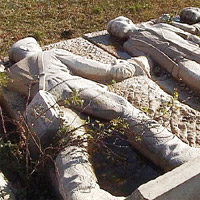Une lettre volée de René Descartes ressurgit
Et l’on reparle du comte Guglielmo Libri Carucci dalla Sommaja. Mais qui est-ce? Un mathématicien né à Florence en 1803 et mort en 1869. Entre ces deux dates, ce savant a commis un vol qui, dans le domaine intellectuel, peut s’apparenter à la célèbre attaque du train postal Londres-Glasgow en 1963. C’est en tout cas le parallèle que dresse d’emblée le New York Times dans son édition de mercredi.
Guglielmo Libri, pour faire court, a dérobé plusieurs milliers de livres et de manuscrits précieux à l’Institut de France où il était inspecteur à partir de 1841. Parmi ces trésors, 72 lettres du philosophe René Descartes. Depuis cette disparition funeste, l’Institut traque tant bien que mal les lettres disparues. A ce jour, 45 ont été retrouvées sur les 72.

Une de plus vient de s’ajouter à ce tableau de chasse: le 11 février dernier, jour anniversaire de la mort de Descartes, un pur hasard, Gabriel de Broglie, chancelier de l’Institut de France, reçoit un téléphone du directeur d’une petite université de Pennsylvanie, Haverford College. Le responsable américain vient de découvrir que ses archives possèdent de façon indue une lettre manuscrite de quatre pages de René Descartes. Il tient à retourner cette rareté au plus vite à son propriétaire.
Publicité
C’est un chercheur hollandais qui a retrouvé la trace de cette lettre aux Etats-Unis. Spécialiste de Descartes, Erik-Jan de Bos surfait sur Internet un soir quand il glissa sur une mention du nom du philosophe français dans le descriptif des archives de Haverford College.
La lettre en question, datée du 27 mai 1641 et adressée à un proche ami de Descartes, atteste que le philosophe a modifié la structure des Méditations métaphysiques jusqu’à la dernière minute avant l’impression. Susceptible d’être attaqué pour hérésie, Descartes envoyait ses textes à un réseau touffu de correspondants et prenait scrupuleusement en compte leurs remarques.
Quant au comte Guglielmo Libri, il a évité les dix ans d’emprisonnement qui l’attendaient en France en fuyant en Grande-Bretagne. Il y est devenu riche. En vendant des livres. Et des lettres. [Lisbeth Koutchoumoff, Le Temps]






